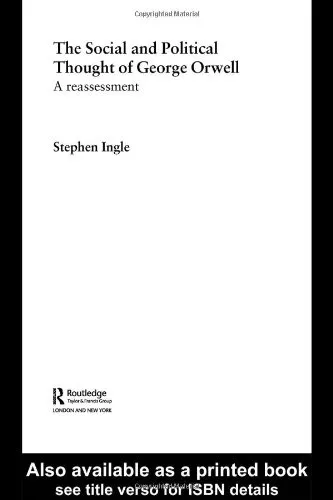The Social and Political Thought of George Orwell: A Reassessment
4.5
Reviews from our users

You Can Ask your questions from this book's AI after Login
Each download or ask from book AI costs 2 points. To earn more free points, please visit the Points Guide Page and complete some valuable actions.Introduction to "The Social and Political Thought of George Orwell: A Reassessment"
Written by Stephen Ingle, "The Social and Political Thought of George Orwell: A Reassessment" plunges deep into the intellectual, social, and political frameworks that shaped one of the 20th century's most iconic authors. George Orwell, the pen name of Eric Arthur Blair, is widely celebrated for his sharp critiques of social injustice, authoritarian governance, and ideological hypocrisy. This book offers a fresh perspective on Orwell’s ideas, addressing the timeless relevance of his political philosophy while shedding light on lesser-discussed themes embedded in his work.
Rather than presenting Orwell solely as a literary genius, Stephen Ingle reassesses him as a thinker profoundly engaged with the social and political dilemmas of his era. The book explores Orwell’s development from a colonial officer in Burma to a passionate anti-fascist writer, revealing how his personal experiences shaped his evolving ideology. Ingle meticulously analyzes major works such as "1984," "Animal Farm," and lesser-known essays, weaving them into a cohesive understanding of Orwell’s belief system.
Detailed Summary of the Book
"The Social and Political Thought of George Orwell: A Reassessment" thoroughly examines the shifts in Orwell’s outlook during his lifetime. It provides insights into how his principles, rooted in democratic socialism, were influenced by his direct encounters with the inequalities of imperialism, the tragedies of war, and the failures of totalitarian systems.
Stephen Ingle structures the book into key thematic areas: Orwell’s critique of authoritarianism, his warnings against ideological extremism, and his pursuit of social justice—as evidenced both in his fiction and non-fiction. The text reveals Orwell’s striking ability to balance cynicism and hope while striving to articulate the human struggle against oppression. Ingle also reinterprets Orwell's ambivalence toward technological progress, capitalism, and organized religion, challenging conventional views of the author.
By reframing Orwell’s writings within the political contexts of his time, the book vividly captures the urgency and ethical depth behind works like "Homage to Catalonia," which recounts Orwell’s experiences in the Spanish Civil War, and "The Road to Wigan Pier," a searing indictment of class inequalities. At the heart of the book lies a deeper question: what can Orwell teach us about justice, freedom, and the human condition today?
Key Takeaways
Here are some of the central insights drawn from the book:
- Orwell's critique of authoritarianism transcends traditional political binaries, making his work relevant in diverse political climates.
- Democratic socialism, as envisioned by Orwell, is rooted in empathy, practicality, and a rejection of abstract dogma.
- The role of personal experience in shaping political thought helps explain Orwell’s unique perspective as a writer.
- Orwell’s emphasis on the importance of truth—whether in journalism or fiction—continues to resonate in contemporary debates about media and propaganda.
- His moral philosophy underscores the significance of small, individual acts of resistance against systemic oppression.
Readers will come away with a deeper appreciation not only for Orwell’s legacy but also for the conditions under which courage and integrity emerge in intellectual and political life.
Famous Quotes from the Book
Stephen Ingle incorporates some of Orwell’s most iconic quotes, which continue to spark reflection:
"If liberty means anything at all, it means the right to tell people what they do not want to hear."
"Power is not a means; it is an end. One does not establish a dictatorship in order to safeguard a revolution; one makes a revolution in order to establish a dictatorship."
"The real test of a man is whether he’ll accept life without taking the coward’s way out."
These enduring words serve to remind us of Orwell’s unwavering commitment to free expression, even in the face of oppression.
Why This Book Matters
"The Social and Political Thought of George Orwell: A Reassessment" is an essential read for students, historians, and anyone passionate about political theory and social justice.
Stephen Ingle contributes a comprehensive and nuanced examination of Orwell’s intellectual legacy, answering questions that are increasingly relevant in today’s polarized world. This book matters because it not only revisits Orwell’s ideas but also interrogates their ongoing significance in addressing inequality, sustaining democracy, and preserving freedom of thought.
As authoritarian regimes rise globally and misinformation challenges public discourse, Orwell's writings—as reinterpreted by Ingle—offer timeless lessons in courage, ethical decision-making, and holding power accountable. This book is a guide for understanding how thoughtful resistance can shape a more just society, making it indispensable in both academic and personal explorations of Orwell’s enduring wisdom.
Free Direct Download
You Can Download this book after Login
Accessing books through legal platforms and public libraries not only supports the rights of authors and publishers but also contributes to the sustainability of reading culture. Before downloading, please take a moment to consider these options.
Find this book on other platforms:
WorldCat helps you find books in libraries worldwide.
See ratings, reviews, and discussions on Goodreads.
Find and buy rare or used books on AbeBooks.
1139
بازدید4.5
امتیاز50
نظر98%
رضایتReviews:
4.5
Based on 0 users review
"کیفیت چاپ عالی بود، خیلی راضیام"
Questions & Answers
Ask questions about this book or help others by answering
No questions yet. Be the first to ask!


